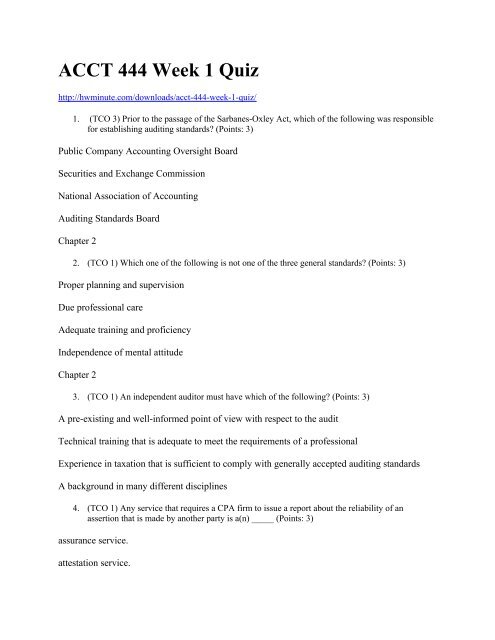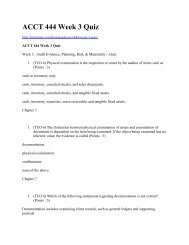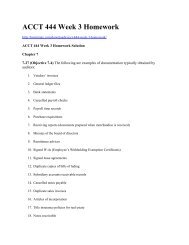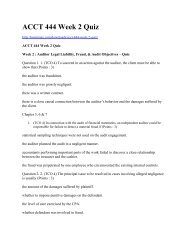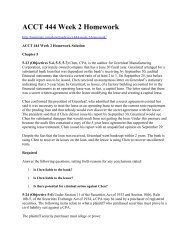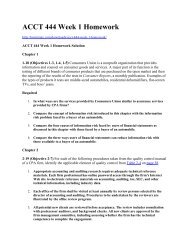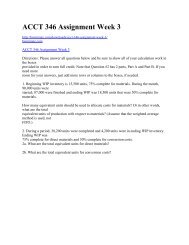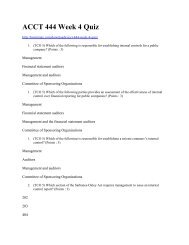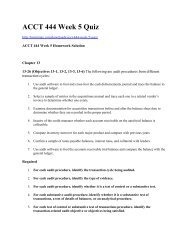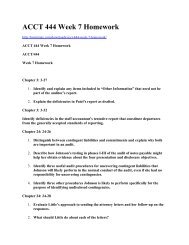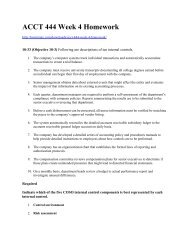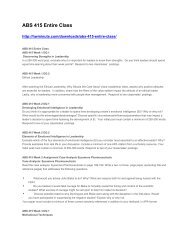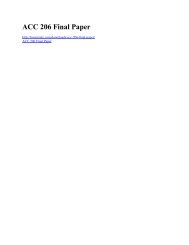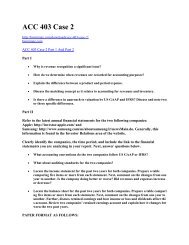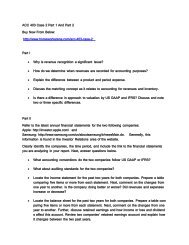ACCT 444 Week 1 Quiz
You also want an ePaper? Increase the reach of your titles
YUMPU automatically turns print PDFs into web optimized ePapers that Google loves.
<strong>ACCT</strong> <strong>444</strong> <strong>Week</strong> 1 <strong>Quiz</strong><br />
http://hwminute.com/downloads/acct-<strong>444</strong>-week-1-quiz/<br />
1. (TCO 3) Prior to the passage of the Sarbanes-Oxley Act, which of the following was responsible<br />
for establishing auditing standards? (Points: 3)<br />
Public Company Accounting Oversight Board<br />
Securities and Exchange Commission<br />
National Association of Accounting<br />
Auditing Standards Board<br />
Chapter 2<br />
2. (TCO 1) Which one of the following is not one of the three general standards? (Points: 3)<br />
Proper planning and supervision<br />
Due professional care<br />
Adequate training and proficiency<br />
Independence of mental attitude<br />
Chapter 2<br />
3. (TCO 1) An independent auditor must have which of the following? (Points: 3)<br />
A pre-existing and well-informed point of view with respect to the audit<br />
Technical training that is adequate to meet the requirements of a professional<br />
Experience in taxation that is sufficient to comply with generally accepted auditing standards<br />
A background in many different disciplines<br />
4. (TCO 1) Any service that requires a CPA firm to issue a report about the reliability of an<br />
assertion that is made by another party is a(n) _____ (Points: 3)<br />
assurance service.<br />
attestation service.
tax service.<br />
accounting and bookkeeping service.<br />
Chapter 1<br />
5. (TCO 1) Which of the following statements is incorrect regarding the SEC’s partner rotation<br />
rules? (Points: 3)<br />
The lead and concurring partners are subject to a 5-year time out period.<br />
All audit partners must rotate off the audit engagement after 5 years.<br />
Other audit partners are subject to a 2-year time out period.<br />
Small firms may be exempted from the partner rotation requirement.<br />
6. (TCO 3) Burrow & Co., CPAs, have provided annual audit and tax compliance services to Mare<br />
Corp. for several years. Mare has been unable to pay Burrow in full for services Burrow rendered<br />
19 months ago. Burrow is ready to begin fieldwork for the current year’s audit. Under the ethical<br />
standards of the profession, which of the following arrangements will permit Burrow to begin the<br />
fieldwork on Mare’s audit? (Points: 3)<br />
Mare engages another firm to perform the fieldwork, and Burrow is limited to reviewing the<br />
workpapers and issuing the audit report.<br />
Mare sets up a 2-year payment plan with Burrow to settle the unpaid fee balance.<br />
Mare gives Burrow an 18-month note payable for the full amount of the past due fees before<br />
Burrow begins the audit.<br />
Mare commits to pay the past due fee in full before the audit report is issued.<br />
Chapter 2<br />
7. (TCO 3) Independence in auditing means (Points: 3)<br />
remaining aloof from a client.<br />
taking an unbaised and objective viewpoint.<br />
not being financially dependent on a client.<br />
being an advocate for a client.<br />
Chapter 4
8. (TCO 3) The financial interests of which of the following parties would not be included as a<br />
direct financial interest of the CPA? (Points: 3)<br />
Dependent child<br />
Relative supported by the CPA<br />
Spouse<br />
Sibling living in the same city as the CPA<br />
Chapter 4<br />
9. (TCO 1) The phrase U.S. generally accepted accounting principles is an accounting term that<br />
(Points: 3)<br />
encompasses the conventions, rules, and procedures necessary to define U.S. accepted<br />
accounting practice at a particular time.<br />
provides a measure of conventions, rules, and procedures governed by the AICPA.<br />
is included in the audit report to indicate that the audit has been conducted in accordance with<br />
generally accepted auditing standards (GAAS).<br />
includes broad guidelines of general application but not detailed practices and procedures.<br />
Chapter 1<br />
10. (TCO 1) Which of the following statements best describes the ethical standard of the profession<br />
pertaining to advertising and solicitation? (Points: 3)<br />
A CPA may advertise in any manner that is not false, misleading, or deceptive.<br />
There are no prohibitions regarding the manner in which CPAs may solicit new business.<br />
All forms of advertising and solicitation are prohibited.<br />
A CPA may only solicit new clients through mass mailings.<br />
1. (TCO 3) The Sarbanes-Oxley Act applies to which of the following companies? (Points : 3)<br />
Privately held companies<br />
All companies<br />
All public companies and privately held companies with assets greater than $500 million
Public companies<br />
Chapter 1<br />
Question 4. 4. (TCO 1) An operational audit has as one of its objectives to (Points : 3)<br />
make recommendations for improving performance.<br />
determine whether the financial statements fairly present the entity’s operations.<br />
evaluate the feasibility of attaining the entity’s operational objectives.<br />
report on the entity’s relative success in attaining profit maximization.<br />
Chapter 1<br />
Question 5. 5. (TCO 1) Which of the following services do not need to be preapproved by the<br />
audit committee of an issuer? (Points : 3)<br />
Nonaudit services related to internal control over financial reporting<br />
Tax services<br />
Nonaudit services that are less than 5 % of total revenues from the audit client<br />
Services provided by the auditor on a recurring basis<br />
Question 8. 8. (TCO 3) Several months after an unqualified audit report was issued, the auditor<br />
discovered the financial statements were materially misstated. The client’s CEO agrees that there<br />
are misstatements, but refuses to correct them. She claims that confidentiality prevents the CPA<br />
from informing anyone. (Points : 3)<br />
The CEO is incorrect, but because the audit report has been issued, it is too late.<br />
The CEO is correct and the auditor must maintain confidentiality.<br />
The CEO is correct, but to be ethically correct the auditor should violate the confidentiality rule<br />
and disclose the error.<br />
The CEO is incorrect, and the auditor has an obligation to issue a revised audit report, even if the<br />
CEO will not correct the financial statements.<br />
Chapter 4<br />
Question 9. 9. (TCO 1) Which of the following terms identifies a requirement for audit<br />
evidence? (Points : 3)
Adequate<br />
Disconfirming<br />
Reasonable<br />
Appropriate<br />
Chapter 1<br />
Question 10. 10. (TCO 1) The auditor of an issuer may provide which of the following tax<br />
services? (Points : 3)<br />
Tax services for immediate family members of corporate officers<br />
Tax planning services<br />
Tax services for officers of the issuer<br />
Services related to confidential tax transactions<br />
5. (TCO 1) Jackson & Company, CPAs, plan to audit the financial statements of Perigee<br />
Technologies, an issuer as defined under the Sarbanes-Oxley Act of 2002. Which of the following<br />
situations would impair Jackson’s independence? (Points : 3)<br />
Discovering that Lowe, the chief financial officer of Perigee, started his accounting career 10<br />
years earlier as a staff accountant for Jackson & Company and continues to maintain ties with<br />
current partners at the firm<br />
Provision of personal tax services to Johnson, the accounts payable manager of Perigee<br />
Audit of Perigee’s internal control is performed contemporaneously with the annual financial<br />
statement audit<br />
Preparation of Perigee’s routine annual tax return, where Jackson’s fee will be calculated as a<br />
percentage of the tax refund obtained


